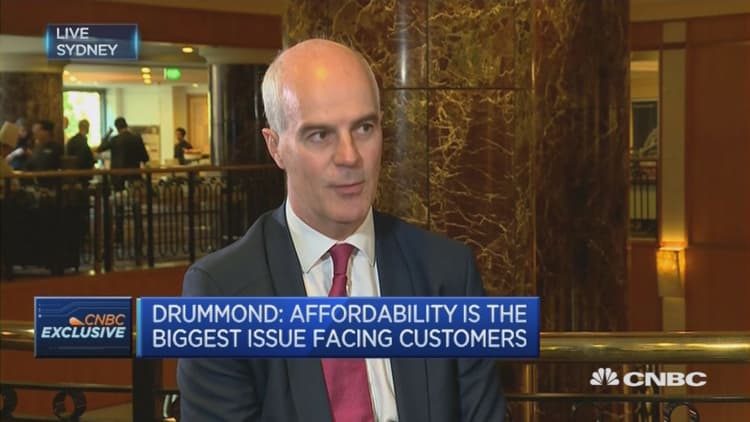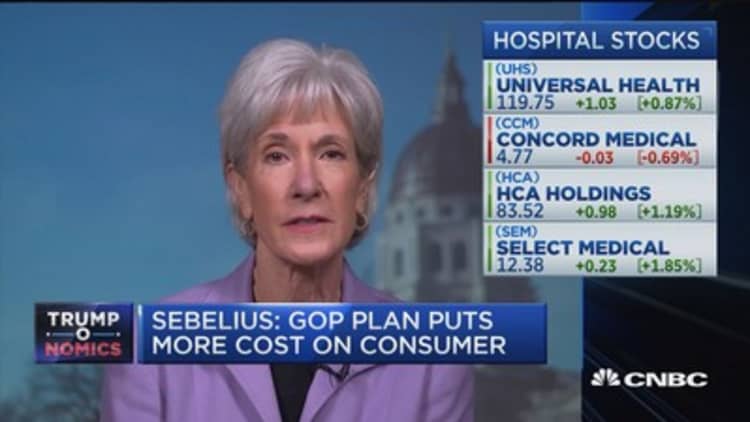Congressional leaders took a victory lap at the White House along with President Donald Trump, after passing the American Health Care Act. While they acknowledged it's just the first step, they say by repealing Obamacare regulations they will be able to bring down health insurance premium costs for Americans.
"I tell you, people suffered so badly with the ravages of Obamacare. As far as I'm concerned your premiums will come down," said Trump after the vote. "This will get passed through the Senate. I feel so confident."
One of the ways the House bill aims to reduce costs is by letting states opt out of Obamacare insurance benefit requirements, to allow the sale of less costly plans. The Affordable Care Act's essential health benefit requirement means some people pay higher premiums for services they don't use.
For insurers, that potential variability in rules adds a new level of complexity.

"At this point, there's so much uncertainty. We're still talking about state waivers. It's not clear what the states are going to do as a consequence of that," said Dr. Robert Pearl, CEO of the Permanente Medical Group, a unit of Kaiser Permanente.
The AHCA also gives states the option of taking some high-cost enrollees with pre-existing conditions who may have to drop coverage, and creating a separate high-risk pool to cover them. The bill provides up to about $15 billion a year in funding for the high-risk pool through 2026.
Analysts at Avalere Health estimate that funding could cover about 600,000 people. Yet, in Texas alone, there are nearly 200,000 people with pre-existing chronic conditions who'd qualify.
"If any large states receive a waiver, many chronically ill individuals could be left without access to insurance," said Caroline Pearson, senior vice president at Avalere.
Kevin Counihan, who served as chief of HealthCare.gov under the Obama administration, said there's too much uncertainty in the way the opt-in program is outlined to know whether the funding is adequate.
"We just don't know how big the number of states are [that will opt in]. Two is fine. Fifteen — not close to enough," said Counihan.
Actuaries say the flexibility the bill gives states when it comes to using federal funds for creating high-risk pools could help bring overall premiums down for healthy people in the state market individual health-care policies.
"About one percent of the population incurs 30 percent of the costs," explained David Dillon, a fellow with the Society of Actuaries. "The premiums are going to come down. However, those 30 percent of the claims aren't going away. They have to be funded somehow."
At the individual level, there will be new winners and losers. The House bill would leave Obamacare credits tied to premium costs in place for next year. After that, individuals on the exchange would get tax credits ranging from $2,000 to $4,000 depending on their age; the credits get phased out for those earning over $75,000 a year.
For healthier younger people in rural states with lower health costs, the new credits could be more generous. For lower-income, older enrollees in higher cost states, the new credits could mean a big cut in premium assistance.

"The tax credit should be enhanced to reduce premiums and better meet the needs of people with low and modest incomes, are older, or live in areas with high health care costs," said Marilyn Tavenner, CEO of America's Health Insurance Plans, the health insurance trade group.
"The American Health Care Act needs important improvements to better protect low- and moderate-income families," she said, adding, "We stand ready to work with members of the Senate and all policymakers, offering our recommendations for how this bill can be improved."
The bill does not address the near-term funding of $12 billion in Obamacare cost-sharing subsidies next year. Those subsidies lower the co-insurance payments low-income Obamacare enrollees pay out of pocket. That's funding which insurers say is key to deciding whether they'll offer exchange coverage in 2018.
"If that gets cut off, a large percent might leave the market," said Counihan.
The American Medical Association, which represents doctors, had opposed the bill. The group condemned the largely party-line vote that saw the legislation pass 217 to 213, with no Democratic votes and 20 Republicans opposing the measure.
"The bill passed by the House today will result in millions of Americans losing access to quality, affordable health insurance, and those with pre-existing health conditions face the possibility of going back to the time when insurers could charge them premiums that made access to coverage out of the question," said Dr. Andrew Gurman, the AMA's president. He urged the Senate to work on a bipartisan plan that helps fix problems with Obamacare.
House Speaker Paul Ryan cited insurers leaving the market now as the reason for moving forward with AHCA reforms. He noted ahead of the House vote that Aetna said this week it was pulling out of the individual market in Virginia for 2018, after pulling out of Iowa. Meantime, the last statewide insurer in Iowa said it, may have to cut back on coverage in the state.
"We still have a lot of work to do to get this signed into law, and I know our friends in the Senate are eager to get to work," Ryan said in the White House Rose Garden after passage of the bill.
"We are going to see that work through. You know why we're going to see this work through? Because the issues are just too important. The stakes are just too high," he said.
The AHCA was passed along party lines, without a Congressional Budget Office estimate on the impact the bill. The CBO score could come out while the House is in recess next week. That could well influence the next steps toward Obamacare repeal in the Senate.
Watch: Bill George says GOP puts whole insurance market at risk



